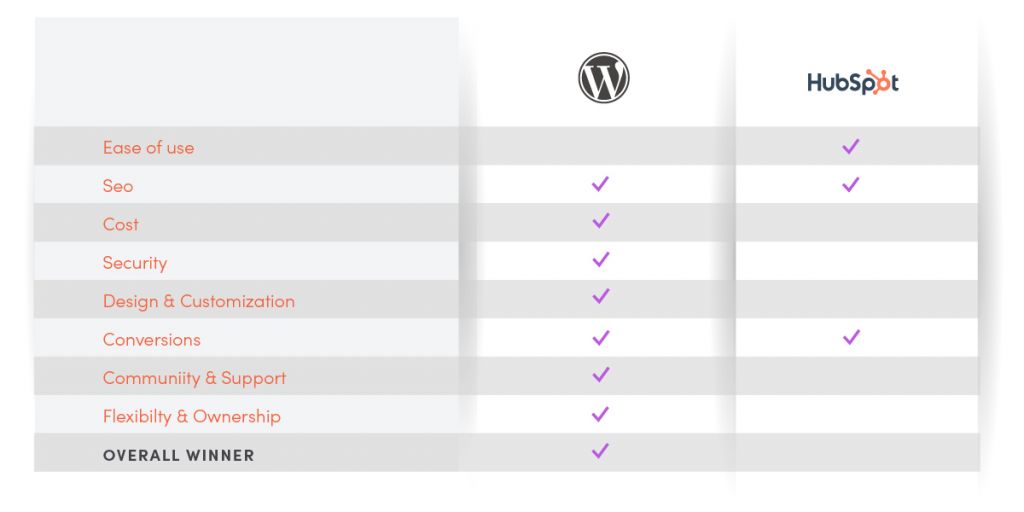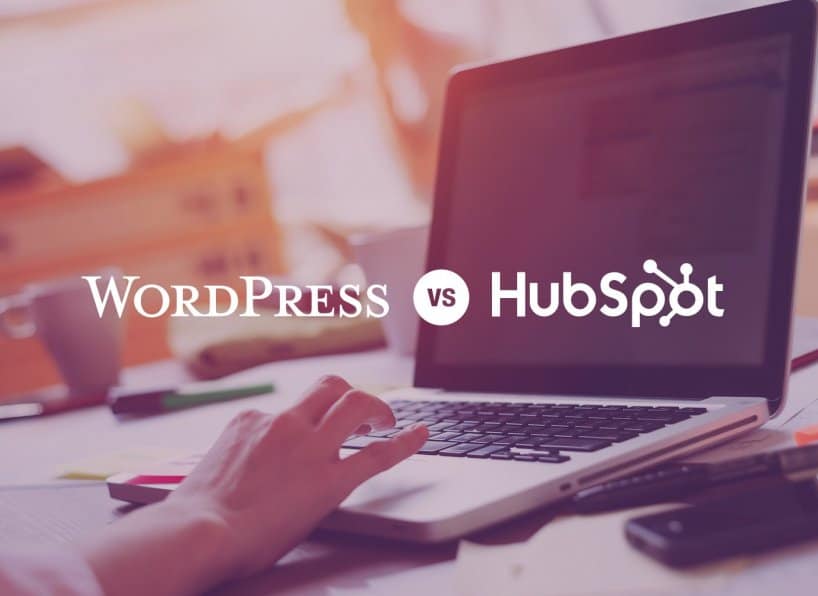Choosing the right content management system (CMS) largely depends on your goals, your resources and, in some cases, your industry. At Vital we are an open-source shop — these days we typically build in WordPress, Drupal and Magento with the occasional Hubspot COS/CMS build. We’ve been doing this since 2001, so we’ve come across it all.
When it comes to picking a CMS, there are many options to choose from. The two most popular CMS platforms, for those with digital marketing in mind, are definitely WordPress and HubSpot. In this blog, we dive into what makes each platform unique, along with the benefits and limitations of each so that you can make the best CMS choice for your business.
When comparing the two platforms we examined eight important factors including:
- Ease of use
- SEO
- Cost
- Security
- Design and Customization
- Conversions
- Community and Support
- Flexibility and Ownership
The Showdown: HubSpot vs. WordPress
 Ease of Use
Ease of Use
WordPress
One reason for WordPress’s popularity is its simplicity and ease of use. With thousands of themes available, you can build and design a professional looking website without having to learn how to code. Or, you can have a developer to custom-code your own theme and/or plugins, or you can hire a WordPress design and development agency (like Vital).
And because WordPress is so popular and is an open-source platform, there are thousands of helpful YouTube videos on sites like YouTube and WordPress.tv and user forums that can aid you in learning certain functionality or adding new features to your site.
HubSpot
Similarly, HubSpot was designed to make it easy for users to get up and running quickly. You can choose from one of HubSpot’s pre-built templates or design your own from scratch. HubSpot is also mobile/tablet optimized right out of the box and offers a host of built-in marketing tools such as:
- Analytics
- Marketing automation
- Lead management
- And more
Unlike WordPress however, HubSpot requires you to utilize HubSpot Markup Language (HubL) when pulling in dynamic content. While WordPress uses the common PHP dynamic scripting language which is widely known and used across the majority of CMS’, HubSpot uses HubL which requires developers or those coding in HubSpot to learn a new coding language. HubL is a proprietary language developed by HubSpot and doesn’t allow for the same level of customization that PHP language does.
And, while, the templates in HubSpot are good, unless you are a small business or start-up, using a HubSpot template is not going to give you the professional functionality you likely need — meaning it won’t be able to integrate with complex systems.
But, if it’s simply ease of use you are looking for and a website that you can get up and running fast (with a pre-built template), and with all the built-in marketing tools you’ll need to promote your business, HubSpot’s got you covered.
Winner: It’s a tough call, but we will give it to HubSpot on this one.
 Search Engine Optimization
Search Engine Optimization
SEO — It’s the name of the game, at least if you care about marketing your business online. The success of your SEO is a combination of the tools and plugins you utilize and the strategy you employ — not just the CMS platform your site is built on.
HubSpot
HubSpot offers robust SEO tools that offer analysis capabilities not offered through most plugins available for WordPress. For example, HubSpot will scan all of you site pages and offer up multiple suggestions on ways to improve SEO rankings for each page.
WordPress
But, if you’re an ecommerce company or need to pull information from a database into your site, Hubspot is NOT the platform for you. HubSpot utilizes its own database and does not support data base integration, making it a no go for many businesses, especially those in e-comm. WordPress on the other hand is highly configurable and does support database integration.
Both WordPress and HubSpot offer a host of SEO tools that help you optimize your content and analyze your results. These SEO tools come standard in HubSpot, while in WordPress you must purchase the plugins (or download for free) and add them to your site. Yoast SEO and other similar plugins for WordPress are available at no cost.
Winner: Tie
 Cost
Cost
When comparing WordPress vs. HubSpot, the pricing can get a little murky. That’s because although WordPress is technically free, you will have to purchase hosting and plugins to get certain functionality that comes standard in HubSpot. That might not be such a bad option when you consider the monthly cost of HubSpot.
HubSpot
One of the biggest drawbacks to using the HubSpot CMS is the enormous price tag that comes with it. Here is how their pricing breaks down:
Website: $300/month + (choose one marketing package below)
- Basic: $200/month + one time onboarding fee of $600
- Pro: $800/month + one time onboarding fee of $3,000
- Enterprise: $2,400/month + one time onboarding fee of $5,000
That means you’re paying at least $1,100 just to get your site up and running for one month.
WordPress (.org)
WordPress is free. However, you will have to pay for hosting (approximately $10-$50 per month), and your domain name (cost will vary greatly, but if you already have a business you likely already have a domain name and know what you pay).
If you are going to utilize a theme, costs vary. For some themes you will pay a one-time fee, whereas other themes you will pay yearly but only for access to theme updates; you are able to use the theme indefinitely. And then there are the thousands of themes that are free!
Next, you’ll need WordPress plugins – many are available for free, while others will you cost you to install. Some popular plugins that offer similar functionality to the built-in marketing tools that come standard with HubSpot, are:
- Yoast SEO – Basic version is free, Premium is $89/year
- WooCommerce (for e-commerce sites) – Free
- MailChimp – Three levels: New Business (Free), Growing Business ($15/month), Pro Marketer ($299/month)
- Google Analytics – Free
- OptinMonster – Three levels: Basic ($9/month), Plus ($19/month), Pro ($29/month)
- Gravity Forms – Three levels: Personal License ($59/year), Business License ($159/year), Developer License ($259/year)
One critical piece of information that we must mention is that there are two options when working with WordPress: WordPress.com and WordPress.org. For the sake of this piece we are mostly focused on WordPress.org. However, it is important to understand the distinction between the two. WordPress.com offers a more bundled approach similar to HubSpot, where you get hosting, a domain name, a GSuite email and access to hundreds of free themes, all for one monthly cost. Plus, you can purchase the JetPack plugin (Premium – $9/month, Professional – $29/month) which gives you access to tons of features such as traffic and SEO tools and additional themes.
Here is how WordPress.com pricing breaks down:
- Free: $0/month
- Personal: $5/month
- Premium: $8/month
- Business: $25/month
- eCommerce: $45/month
The nice thing about WordPress.org is that you only pay for the tools you want. WordPress.org is a la carte, whereas HubSpot is bundled. Don’t want those annoying pop-ups on your site? With HubSpot you don’t need to use them, but you’ll still be paying for them. but with WordPress, you only pay for the functionality you want.
With WordPress, an exact number is hard to pinpoint due to the plethora of options, but you will probably pay somewhere around $20-$50 a month for your domain name, hosting and theme. Then you can add on whichever plugins you choose, and you will still not be anywhere close to the $1,100 price tag of HubSpot.
Overall, WordPress is significantly cheaper than HubSpot and gives you the freedom to add or remove plugins as you choose.
Winner: WordPress
 Security
Security
HubSpot’s COS is proprietary software hosted on a managed SaaS platform. WordPress is open-source software that is self-hosted (you choose the host).
WordPress
Since the code for open-source software is freely available on the internet, many people believe that it poses less of a risk than proprietary software, whose code is only available to authorized users. The biggest reason open-source is thought to be more secure is that you (or a developer) can check to ensure the code is secure, instead of blindly trusting the vendor who wrote the code. When using open-source software, it is important to choose a host that offers strong security features, such as an SSL certificate, backups, a firewall, malware scanning and cleanup.
HubSpot
HubSpot’s COS is built on a closed-source platform, so only HubSpot developers have access to the code. This means there isn’t the same community of support and self-verification of the code is not possible. That being said, there is the argument that closed-source is more secure because of its limited accessibility. Because it can be great to give open access to an entire community of developers that can work on improving solutions and tools, this also means that those with mal-intent have access.
The bottom line is that neither one nor the other is definitively more secure than the other. But unlike closed-source, open-source can be verified and refined over time.
Winner: WordPress
 Design & Customization
Design & Customization
WordPress
If design is a top priority for you – and it should be – WordPress is your best option. In this platform, the customization possibilities are endless. But if you’re not a designer or developer and you are looking for a professionally designed site that utilizes templates and is easy to manage, HubSpot fits the bill.
Flying Hippo, a creative agency out of Des Moines, IA, made the switch from the WordPress CMS to the HubSpot COS – and then ultimately switched back to WordPress. One of the drawbacks they discovered with HubSpot was its rigidity in terms of design capabilities.
“The design, simply put, wasn’t that hot. And as we twisted knobs and flicked switches in HubSpot’s Template Builder, we realized we couldn’t make an accurate replica of what our blog looked like on WordPress. Their system of modules is much more streamlined and plug-and-play focused than WordPress, which makes for a blog that’s much more function than form.”
Winner: WordPress
 Conversions
Conversions
Converting visitors should be a primary goal of your website, and to do that you need actionable forms that help convert these visitors into leads.
WordPress
To do this on a WordPress-hosted site, you will have to install a plugin such as a Gravity Forms, JotForm or Ninja Forms. But, just because these features aren’t built in doesn’t make them any less effective.
HubSpot
On HubSpot, this functionality is built in, so everything you’ll need to successfully attract and convert visitors on your website will be included in your HubSpot COS.
A cool conversion tool which HubSpot recently launched is its smart content. Smart content is a personalization tool that allows you to tailor content to target users based on certain pre-defined characteristics or behaviors or where they are in the buying cycle.
Winner: Tie
 Community & Support
Community & Support
Both platforms offer great support and have large enough communities to extend knowledgeable advice to users in need.
HubSpot
HubSpot offers a support forum and US-based customer service reps to help users who have an active account. They also provide great marketing advice and tips through their website, inbound.org and HubSpot Academy. HubSpot, as always though, is more marketing focused than design or development focused. Meaning, if you have questions on marketing, they are great, but it may be harder to find the free technical advice you need in the HubSpot community.
WordPress
WordPress has a prolific community of developers and contributors that offer users technical and design tips and advice via documentation, a community support forum and a WordPress handbook, not to mention on YouTube, WordPress.tv, and via other online channels.
Due to the size of the WordPress community, any question you have is literally just a Google search away. The WordPress community is large and advice is free, which is one of the greatest benefits about working on the WordPress CMS.
Winner: WordPress
 Flexibility & Ownership
Flexibility & Ownership
WordPress
Because WordPress is open-source, when you build a site on the platform, you own that site. It is yours to do with as you please and to move from host to host. When you build your site on WordPress, you are building an asset that is not dependent on pricing and licensing fees that come with a proprietary CMS such as HubSpot.
By being free and open-source, there are millions of tech solutions, support and communities available, which means users have access to a vast array of solutions with different price points, different implementation options and different providers. While WordPress offers support for a plethora of solutions in multiple formats as soon as a one is released, HubSpot often lags and offers minimal options once they do catch up.
HubSpot
HubSpot is closed-source, so when you build a site, you don’t own that site; HubSpot does. This can make it a lot harder if you ever decide to move your site to a different host or platform, say WordPress or Drupal. And remember, in HubSpot you’ll be paying $1,100 each month for a site you don’t even own.
HubSpot can be a great solution for many businesses. Especially if you are a smaller company that doesn’t have an in-house development team, marketing team or the resources to build a custom site on WordPress. However, the moment you want flexibility or you want to scale, HubSpot’s COS can pose huge challenges. This is especially true if you have back-end systems like CRM, ERP, inventory, billing or other solutions that you want to connect to your site. Or, if you start on HubSpot and are so successful you realize you need to scale up and move to WordPress, you’re a bit stuck.
Due to the limitations in HubSpot, the software can almost strangle small to mid-size businesses who are looking to grow and scale. Not only that, but due to the closed-source architecture in HubSpot, many solution providers, supporters and communities are unable to reach their full potential and provide the same tools for HubSpot users as they are able to provide for WordPress users.
WordPress = You own your site
HubSpot = You rent your site
Winner: WordPress
The Verdict – WordPress vs. HubSpot
Overall, we believe WordPress is the clear choice for two primary reasons: cost and ownership. HubSpot has created a strong marketing platform that offers users great inbound marketing tools. That’s why we use the marketing package they offer. But when it comes to a CMS, WordPress offers the most value and will ensure you are able to scale your website as your business grows.
What questions or concerns do you have about these two CMS platforms? Let us know! We would love to chat further about which choice is best for your specific business.
